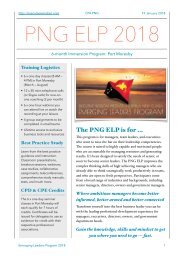Management Resources Guide
the 2018 Management Resources Guide details comprehensive information on the professional services provided by Executive Wisdom Consulting Group.
the 2018 Management Resources Guide details comprehensive information on the professional services provided by Executive Wisdom Consulting Group.
You also want an ePaper? Increase the reach of your titles
YUMPU automatically turns print PDFs into web optimized ePapers that Google loves.
<strong>Management</strong> Thinking Skills Training<br />
Scepticism as a Business Tool<br />
How <strong>Management</strong> can Think Like a Scientist<br />
All programs are designed, written and produced to your organisation’s specific requirements.<br />
What You Will Learn<br />
A 2006 Reader's Digest survey of 1,006 adult Britons reported that 43% said they could read<br />
other people's thoughts or have their thoughts read. 26% said they had sensed when a loved-one<br />
was ill or in trouble. And 62% said that they could tell who was calling before they picked up the<br />
phone. A fifth said that they had seen a ghost, and nearly a third said that they believed that<br />
near-death experiences are evidence for an afterlife. The National Science Foundation (NSF)<br />
concluded: "Such beliefs may sometimes be fuelled by the media's miscommunication of science<br />
and the scientific process."<br />
Part of the problem may be that 70% of people still do not understand the scientific process,<br />
defined as grasping probability, the experimental method, and hypothesis testing. This being<br />
true, it poses questions about the vulnerability of thinking in business. How well can we make<br />
decisions in business when these types of survey results are so worrying? One solution, then, is<br />
to teach how science works to help us be more scientific in business thinking.<br />
Belief systems are powerful, pervasive, and enduring. This course synthesises 30 years of<br />
research to answer the questions of how and why we believe what we do in all aspects of our<br />
lives. In this course, we are interested in understanding not just why people believe weird things<br />
but why people believe anything at all. We form our beliefs for a variety of subjective, personal,<br />
emotional, and psychological reasons in the context of environments created by family, friends,<br />
colleagues, culture, and society at large. After forming our beliefs, we then defend, justify, and<br />
rationalise them with a host of intellectual reasons, cogent arguments, and rational<br />
explanations.<br />
This course will teach you how to reason like a scientist to give you the necessary tools for<br />
evaluating claims and determining whether or not a belief you hold is provisionally true, likely<br />
false, or in between.<br />
Every one of our training programs is uniquely designed and tailored to meet your specific<br />
circumstances and objectives.<br />
Topic Menu includes but is not limited to:<br />
The Virtues of Scepticism.<br />
Scepticism and Science.<br />
Mistakes in Thinking We All Make.<br />
Cognitive Biases and Their Effects.<br />
Wrong Thinking in Everyday Life.<br />
The Neuroscience of Belief.<br />
The Paranormal and the Supernatural.<br />
Science versus Pseudoscience.<br />
Comparing SETI and UFOlogy.<br />
Science, History, and Pseudohistory.<br />
The Lure of Conspiracy Theories.<br />
Inside the Modern Cult.<br />
Your Sceptical Toolkit.<br />
Detective Columbo.<br />
Creative Leadership – Regardless of<br />
your role.<br />
Overcoming roadblocks and barriers.<br />
Living a creative life.<br />
54



